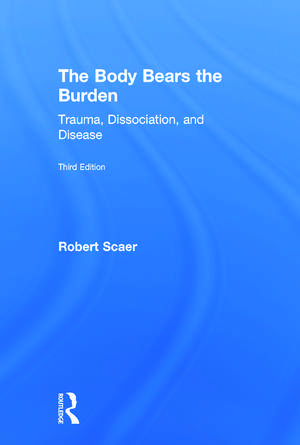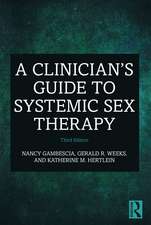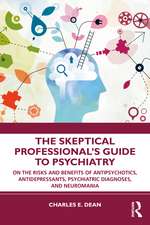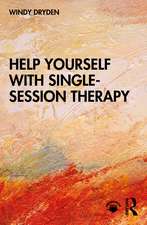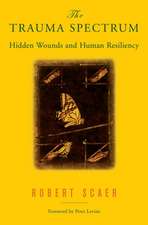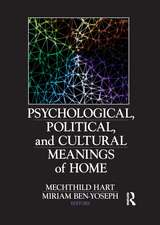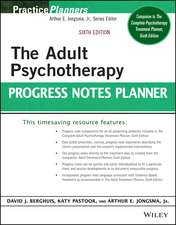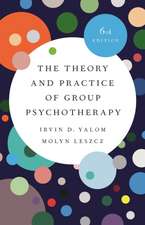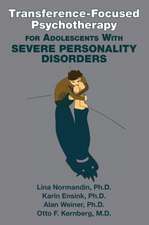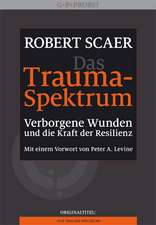The Body Bears the Burden: Trauma, Dissociation, and Disease
Autor Robert Scaeren Limba Engleză Hardback – 13 ian 2014
| Toate formatele și edițiile | Preț | Express |
|---|---|---|
| Paperback (1) | 276.22 lei 22-36 zile | +28.37 lei 5-11 zile |
| Taylor & Francis – 14 ian 2014 | 276.22 lei 22-36 zile | +28.37 lei 5-11 zile |
| Hardback (1) | 1158.84 lei 43-57 zile | |
| Taylor & Francis – 13 ian 2014 | 1158.84 lei 43-57 zile |
Preț: 1158.84 lei
Preț vechi: 1219.84 lei
-5% Nou
Puncte Express: 1738
Preț estimativ în valută:
221.75€ • 232.10$ • 184.56£
221.75€ • 232.10$ • 184.56£
Carte tipărită la comandă
Livrare economică 31 martie-14 aprilie
Preluare comenzi: 021 569.72.76
Specificații
ISBN-13: 9780415641517
ISBN-10: 0415641519
Pagini: 244
Ilustrații: 12
Dimensiuni: 152 x 229 x 18 mm
Greutate: 0.45 kg
Ediția:Revised.
Editura: Taylor & Francis
Colecția Routledge
Locul publicării:Oxford, United Kingdom
ISBN-10: 0415641519
Pagini: 244
Ilustrații: 12
Dimensiuni: 152 x 229 x 18 mm
Greutate: 0.45 kg
Ediția:Revised.
Editura: Taylor & Francis
Colecția Routledge
Locul publicării:Oxford, United Kingdom
Public țintă
Professional and Professional Practice & DevelopmentCuprins
Foreword Bessel van der Kolk Preface Acknowledgments 1. Concepts of Traumatization: The Role of Boundaries 2. Trauma, Instinct, and the Brain: The Fight/Flight/Freeze Response 3. The Whiplash Syndrome I: Symptoms in Search of a Meaning 4. The Whiplash Syndrome II: A Model of the Brain in Trauma 5. Bonding, Attunement and Concepts of Homeostasis 6. Negative Neuroplasticity: Does Trauma Damage the Brain? 7. Somatic Dissocation 8. Diseases of Traumatic Stress 9. Trauma Reenactment 10. Sources of Trauma 11. Trauma Therapy: Essential Ingredients 12. Case Histories: The Somatic Spectrum of Trauma Epilogue Notes Index
Notă biografică
Robert Scaer, MD, has practiced neurology and rehabilitation for 36 years. His three books, The Body Bears the Burden, The Trauma Spectrum, and 8 Keys to Brain–Body Balance, address the intimate relationship between life trauma and chronic disease, the ubiquitous association of modern society with intrinsic sources of trauma, and the role of somatic techniques for healing trauma.
Recenzii
"In this groundbreaking integration of neurology, psychology, and evolutionary biology, Dr. Scaer sheds new light on the dynamics of psychological trauma and provides a way to understand and effectively treat its often misunderstood, intractable effects on the mind and body. This book is a must read for medical and mental-health professionals working with patients struggling with everything from anxiety and PTSD to chronic pain, gastrointestinal distress, and a host of other difficult-to-treat medical disorders."
—Ronald D. Siegel, PsyD, assistant clinical professor of psychology at Harvard Medical School and author of The Mindfulness Solution: Everyday Practices for Everyday Problems
"In The Body Bears the Burden, Dr. Scaer boldly demystifies the profoundly debilitating impact of trauma by forcing new conceptualizations that move treatment toward an integrated biobehavioral approach, emphasizing the adaptive functions of our nervous system as it communicates, often outside awareness, between brain and body."
—Stephen W. Porges, PhD, professor of psychiatry at the University of North Carolina and author of The Polyvagal Theory: Neurophysiological Foundations of Emotions, Attachment, Communication, and Self-regulation
"Dr. Scaer brings the best of medical science and scholarship to his study of trauma-related disease. He understands the effect of trauma to be its grip on the autonomic nervous system, which alters blood flow, hormonal secretion, and neurotransmitter balances of the brain. This lasting disturbance underlies the majority of diseases listed in the DSM in addition to a large number of baffling medical conditions. This volume is great for the most up-to-date understanding of trauma."
—Louis Tinnin, MD, coauthor of The Instinctual Trauma Response and Dual Brain Dynamics: A Guide for Trauma Therapy
"A fascinating and informative book that has the potential to greatly expand awareness of pertinent issues when working with trauma."
—Liz Jeffries, Private Practice, Winter 2014
—Ronald D. Siegel, PsyD, assistant clinical professor of psychology at Harvard Medical School and author of The Mindfulness Solution: Everyday Practices for Everyday Problems
"In The Body Bears the Burden, Dr. Scaer boldly demystifies the profoundly debilitating impact of trauma by forcing new conceptualizations that move treatment toward an integrated biobehavioral approach, emphasizing the adaptive functions of our nervous system as it communicates, often outside awareness, between brain and body."
—Stephen W. Porges, PhD, professor of psychiatry at the University of North Carolina and author of The Polyvagal Theory: Neurophysiological Foundations of Emotions, Attachment, Communication, and Self-regulation
"Dr. Scaer brings the best of medical science and scholarship to his study of trauma-related disease. He understands the effect of trauma to be its grip on the autonomic nervous system, which alters blood flow, hormonal secretion, and neurotransmitter balances of the brain. This lasting disturbance underlies the majority of diseases listed in the DSM in addition to a large number of baffling medical conditions. This volume is great for the most up-to-date understanding of trauma."
—Louis Tinnin, MD, coauthor of The Instinctual Trauma Response and Dual Brain Dynamics: A Guide for Trauma Therapy
"A fascinating and informative book that has the potential to greatly expand awareness of pertinent issues when working with trauma."
—Liz Jeffries, Private Practice, Winter 2014
Descriere
When The Body Bears the Burden made its debut in 2001, it changed the way people thought about trauma, PTSD, and the treatment of chronic stress disorders. Now in its third edition, this revered text offers a fully updated and revised analysis of the relationship between mind, body, and the processing of trauma. Here, clinicians will find detailed, thorough explorations of some of neurobiology’s fundamental tenets, the connections between mind, brain, and body, and the many and varied ways that symptoms of traumatic stress become visible to those who know to look for them.
